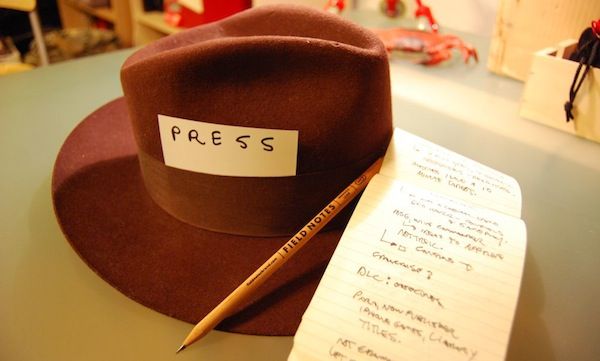This post has not been edited by the GamesBeat staff. Opinions by GamesBeat community writers do not necessarily reflect those of the staff.

Now that the internet's tirade on journalistic integrity is (hopefully) over, I figured it’s about time for me to chime in. And what, you may ask, is so different about my opinion? Well, I agree with this guy — partially.
What I am saying is that we have to have had something in order to lose it, and I’m not convinced that we’ve ever had journalistic integrity. It’s not that journalists don’t exist in this industry, or that no one has journalistic integrity; it’s just that they’re rare things in a field much further behind than it should be.

*GASP* You must think it’s okay that those scumbags sold out!
No. Absolutely not, and it’s not nice to call people scumbags you know.
When I first started down this career path, I fancied myself as an electronic journalist, and many others do. It legitimizes our work and associates us with truly great writers who have understood their medium to an extent that few will ever be able to comprehend. Writers that developed a keen insight into life that allowed them to see beyond the problems of their own time and recognize the issues that lie beneath.
They knew what their limitations were, and those of their medium, but refused to ignore them. Instead, they fully acknowledged and explored them. There was a scandal, and they exposed it; an event was overlooked, and they brought it to light. And when something just wasn’t right, they revealed the truth.
We don’t have many of those — that is, assuming we even have any.
Games “journalism”, as it stands right now, is an awful, pathetic mess of biased opinion articles, critics who critique nothing, and advertisement-laced pieces on games that have yet to be released. There are bright spots as well; some of them even call this site their home, but we certainly don’t have to live up to the same standards as other journalistic fields. As much as I hate to admit it, there are far more reviewers and bloggers than critics and journalists.
And that’s fine — there’s a place for everyone, but if all we’re going to do is state the obvious and repeat stale news, then why are we doing this?
I’m more guilty of this than anyone else, and there are times that I have to ask myself that question. “Why am I really doing this? Do I even have a chance?” I know my work isn’t up to par, and many of my articles showcase this with their short length and lack of depth. Even my reviews, which I’ve had far more time to refine, are no better than those found on countless other niche gaming sites. But I’d like to think that I’ve set myself apart in one very important way — I know just how far away I am from my goal.
Tom Bissel seems to remind me of this whenever his writing skills are displayed, and then I remember why I do this: I love video games. Not as entertainment, not as a hobby or pastime, and certainly not as a way to kill time, but as a medium. I wasn’t lucky enough to witness the birth of gaming, but the more I experience the history of this medium as it unfolds, the easier it is for me to recognize how much potential this new entity has.

Video games aren’t the end-all of human expression or creativity but merely another way to showcase and explore it. We need to understand that and respect the legacy of those that came before.
We, perhaps more than any other group, are a culture born of our era. As the internet grew, we grew. As gaming became something larger, we did too. And as senseless and stereotypical as our image has become, we have seemingly embraced it. Whereas other professionals would be fired for our kind of behavior, many in our line of work flaunt it instead — devising contests to see who can get the most loot or photograph the most booth babes.
That photograph of Geoff Keighley circulating the internet doesn’t bother me at all for one very specific reason: It’s exactly what we’ve become — indifferent, soulless, colorless advertisers. I don’t even care what Geoff was actually doing; it’s not important. That one photo paints a picture that starkly contrasts with what we consider journalistic integrity.
We see a man, dressed entirely in monochromatic colors, sitting in a chair surrounded by advertisements. He does not look happy, and he is not interacting with anything relating to his job. In fact, the only thing marginally related to his profession is another piece of advertising standing in the background.
He does not appear to be a lazy man, for he has kept his appearance neat and clothing clean, but he also seems to be waiting for something. Perhaps he wishes for an attendant to cue him, or maybe a PR representative was supposed to guide him.
Rab Florence was right; this is an important image. We need to study it. Because if we don’t, we may become what Geoff only appeared to be — passive and devoid of a personal opinion. That is, unless we have already become what I fear most — purchased. In the end, I don’t think there is such a thing as journalistic integrity … not for us, not yet. We have too much of a stigma attached to us, and we need to prove the dissenters wrong. All we have for now is a call to a higher standard — a choice to be a critic, instead of an advertiser.
